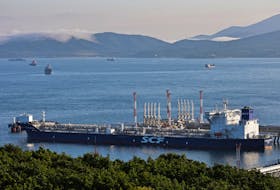Canada has the third largest oil reserve in the world, but Canadian oil is still stuck on land. Earlier in October 2018, Canadian heavy crude was 77 per cent cheaper than the North American Oil.
The world oil prices are on the path to recovery, but the oil prices in Canada are digging for new lows.
Canada has massive reserves of oil but cannot trade them with other countries due to limited oil access to the western coast.
The Trans Mountain pipeline aims to increase the oil-sands crude supply from Alberta to British Columbia.
However, fierce opposition from environmentalists, indigenous people, and provincial politics have made it almost impossible for the pipeline expansion project to break ground. Not only has this dispute crashed the Canadian oil market, but it is also causing more damage to the environment than protecting it.
I believe that Canadians must realize that the Trans Mountain Pipeline Extension Project is beneficial for both the economy and the environment and must go ahead with its construction. Construction of the pipeline will reduce the global greenhouse gas (GHG) emissions.
The demand for oil is not decreasing anytime soon. As per International Energy Agency, oil demand will fall by 2040 only if all the countries in the Paris Agreement go beyond their commitments for their emission targets.
It is true that in 2014, greenhouse gas emissions were 10 per cent higher for the oil sands barrel than the average barrel refined in the United States. But according to an industry report, the GHG emissions have fallen by 21 per cent from 2009 to 2017 and will continue to fall by 23 per cent until 2030. Ironically, the pipeline under question is supposed to transport this newer oil.
Pipelines are the most carbon efficient means of transporting oil. Currently, the Trans Mountain Pipeline is carrying 300,000 barrels per day which will triple in capacity after the expansion project.
If one were to transport this amount by land, one would need a total of 1,400 tanker truckloads or 441 tanker railcars daily. Lack of pipeline capacity has forced railcar usage for oil transportation to an all-time high.
One must look no further than the Wabamun Lake oil spill to look at the environmental disaster of using railcars. A study conducted at the University of Alberta found out that pipelines have 77 per cent less carbon footprint compared to rail transportation when transporting massive volumes of oil over vast distances, which is the case in this problem.
The Trans Mountain pipeline will help the Canadian economy thrive. The pipeline aims to open the Canadian oil market to Asia-Pacific countries which will allow Canadian oil companies to sell oil at a higher price.
Currently, almost all the oil produced in Canada goes to one market, the Midwest of United States. However, there is a limit to the demand of the market.
Bloated oil reserves and weak market demand has forced Canadian producers to sell their oil at a fraction of the global price. At current prices, Canada is set to lose $175 billion in oil revenue over the next 30 years. The pipeline will inject this lost revenue into the Canadian economy by improving Canadian oil access to Asia-Pacific countries.
Like any other project, Trans Mountain Pipeline has its set of challenges.
Many people believe that environmental concerns dwarf economic gains.
For instance, cleaning up an oil spill in the coastal waters would be extremely hard and devastating to the environment. Moreover, the pipeline crosses territories of some First Nations people who do not agree with the continuation of the project.
As a result, when Ottawa approved the pipeline expansion project, some First Nations leaders and environmental groups appealed the Federal Court to overturn the decision. To address these concerns, the federal government set aside $1.5 billion to prevent potential oil spills as part of its Oceans Protection Plan and address potential environmental concerns. It also went on to nationalize the privatized pipeline to speed up the project timeline, but all in vain.
Despite the government’s best efforts, the decision still awaits.
The expansion project is yet to start, and it is up to Canadians to decide its fate. It is time that Canadians realize the importance of the pipeline to the Canadian economy and environment, and rally together to support the cause.
M. Abis Abbas is a Term 3, Mechanical Engineering student at Memorial University. He writes from St. John’s.
Related story:
New Trans Mountain pipeline review doomed to fail: Vancouver mayor-elect
Bibliography
Findlay, M. H. (2018). What Now? | Rebooting Bill C-69. Canada West Foundation.
http://cwf.ca/research/publications/what-now-rebooting-bill-c-69/
Holden, M. (2013). Pipe or Perish: Saving an Oil Industry at Risk. Canada West Foundation.
http://cwf.ca/research/publications/pipe-or-perish-saving-an-oil-industry-at-risk/
Trans Mountain. (2013, December). Volume 5 - Environmental and Social-Economic Assessment. Retrieved from http://transmountain.s3.amazonaws.com/application14/V5A_ESA_BIOPHYSICA L/index.html
Trans Mountain. (2013, December). Volume 6 - Environmental Compliance. Retrieved from http://transmountain.s3.amazonaws.com/application14/V6B_PIPELINE_EPP/ind ex.html








